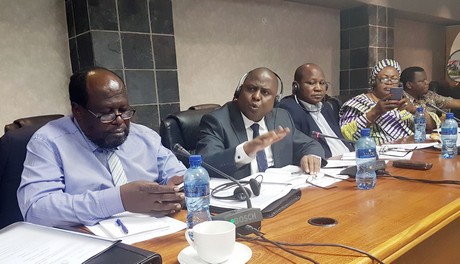
MIDRAND, SOUTH AFRICA: African legislatures have been urged to be at the forefront of combating terrorism and violent extremism, by ratifying and implementing anti terrorism laws.
The parliaments were told to debate, amend or approve bills intended to promote and ensure principles that respect the rule of law and encourage civic participation.
In a speech read for him by Bernadette Lahai, the Fourth Vice President of the Pan African Parliament on Wednesday 8th March 2017, PAP President Roger Nkodo, said that with the increase in terror attacks on the continent, legislators as representatives of the people have a duty to ensure the safety and protection of the very people they serve.
“Parliamentarians should take a leading role in cascading international and continental instruments to their constituencies, and ensure that the citizens are aware and reject acts of terrorism in their communities,” he said.
In a bid to ensure cohesion in addressing terrorism and violent extremism on the continent, the African Union in its 17th Ordinary Session in Malabo, Guinea, adopted the African Model Anti Terrorism Law, in which African Union Member states were encouraged to take full advantage of the Model law to strengthen and update their national legislation. The AU Commission wrote to member states informing them of the Model law and offered them legal assistance to update their legal frameworks.
To date, only three member states; Burkina Faso, Ghana and Mauritius have requested for assistance from the AU Commission.
Prof. Ogenga-Latigo, a PAP member, said that every country in Africa should domesticate the draft anti-terrorism bill developed for Africa. He said that with a standard framework, there would be a co-ordinated approach to tackling terrorism.
Anton du Plessis, the Executive Director, Institute for Security Studies expressed concern that some African governments, however, abuse counter terrorism laws and use them to target certain sections of society.
“We are seeing situations where counter terrorism laws are being abused by governments to clamp down on political dissent, the opposition and the media,” he said.
The workshop (which workshop?), which is being organized under the theme, “Combating terrorism on the African continent: advancing the legislators role” seeks to address the global political framework for terrorism and violent extremism and its implications for Africa. It hopes to address youth radicalisation into terrorism and violence extremism and to also strengthen the role of parliamentarians in preventing and combating terrorism.
In a study about the “Dynamics of youth radicalization in Africa,” which was carried out between 2005 and 2015 in North, West and East Africa, push and pull factors responsible for youth radicalisation into terrorism and violent extremism were identified.
The Committee on Cooperation, International Relations and Conflict Resolution of the Pan African Parliament was informed that among the push factors responsible for youth radicalisation into terrorism and violent extremism in West and East Africa, was state abuse of power, corruption, torture, unemployment and governance problems.
AU Member states have experienced terrorist attacks in various regions by different terrorist groups including Al-Qaeda in the Islamic Maghreb, Al-Shabaab in Eastern Africa, Boko Haram in Chad and groups affiliated to the Islamic State in Libya and Egypt.
While Africa has made some strides in dealing with its traditional security challenges mainly concerned with state security, terrorism remains one of the greatest threats to peace, stability and development on the continent.
